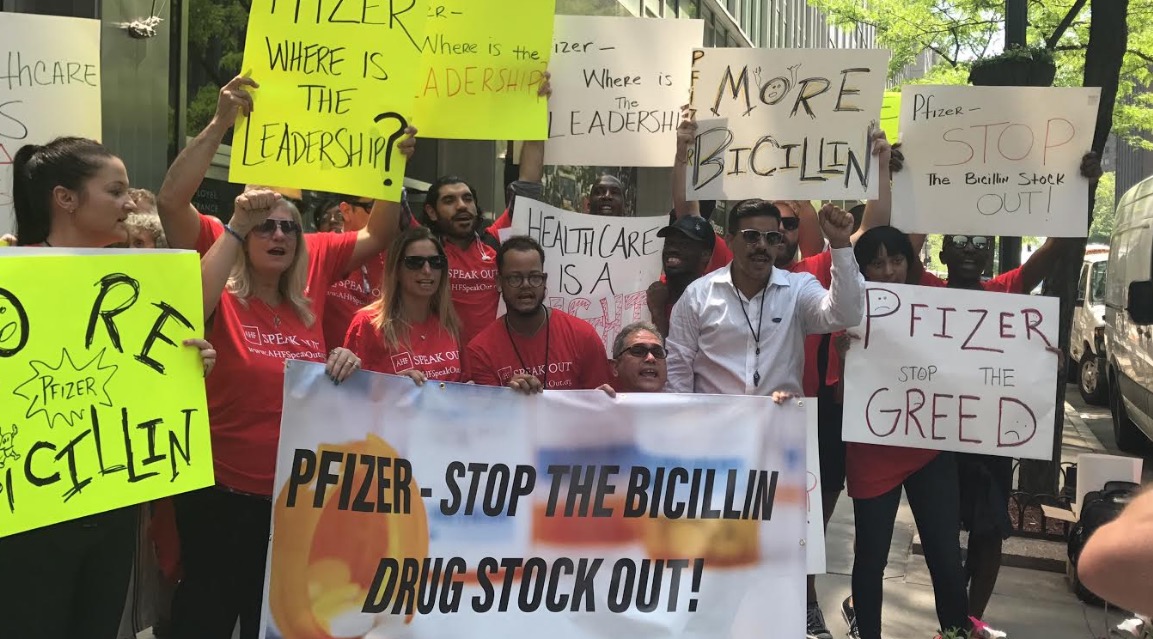
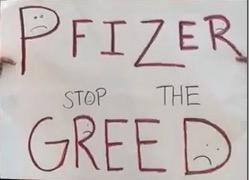
Can someone please explain the logic here? Does this make any sense at all?

You are looking at a well-organized protest aimed at Pfizer (1) for not having any Bicillin L-A (aka penicillin G, or just Bicillin) to sell. Bicillin is the drug of choice for the treatment of syphilis, a sexually transmitted infection that has become much more prevalent in the past decade, especially among gay men (2), but in other populations. There is only one way to catch syphilis—by having sex with someone who already has it. Although condom use will help prevent it, it has been estimated that condoms offer protection against the infection between 50-65 percent of the time.
Untreated syphilis can create a host of health problems; these can be severe, for example, damage to the brain, nerves, eyes, heart, blood vessels, and liver. It can sometimes cause blindness, mental illness, and even death. But, perhaps the biggest threat of the infection is to the unborn children of pregnant women. Fetuses of mothers who are infected with the bacterium are at a particularly high risk. The infection can result in stillbirth, death after birth, and low birth weight, and serious developmental disabilities. This is not an infection you want your child to catch. So, it is no surprise that the shortage of Bicillin is very disturbing to pregnant women who are infected. This, at least on the surface, explains the protest that took place in front of Pfizer headquarters on May 19th. A group called the AIDS Healthcare Foundation was out in force demanding, among other things that:
"Pfizer end its stock out or shortage of Bicillin L-A, a key drug in treatment of syphilis."
So, does it make sense to protest against a company for being out of an important drug? It certainly did to the protestors, and they weren't too shy about making this known.
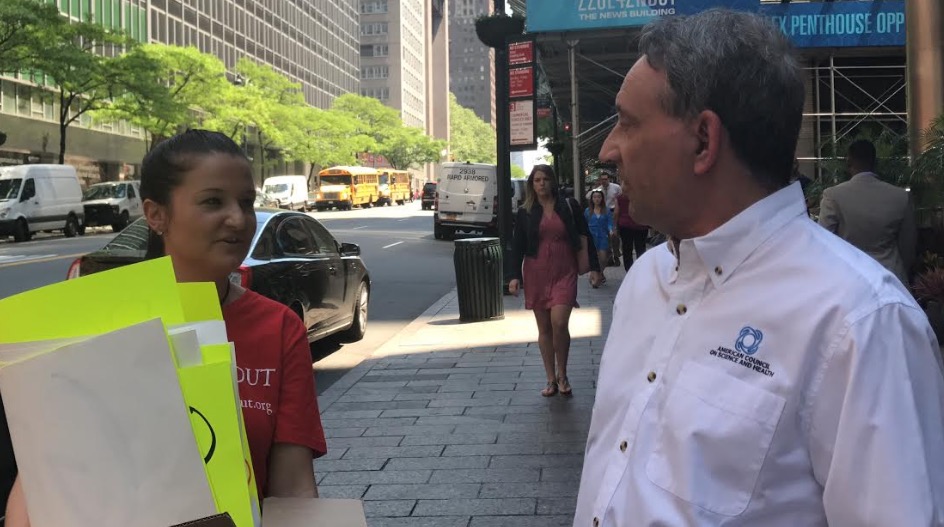
Yours truly and AHF spokeswoman Jessica Reinhart. The ACSH shirt used to be President Hank Campbell's. He will never see it again.
Before we start, I need to disclose that I have no loyalty to the company, nor do I hold a grudge against it, despite the fact that they gave me the boot in 2010 (3). The company gives the American Council no financial support. If you don't believe me, you might as well stop reading now .
AHF spokeswoman, Jessica Reinhart, graciously took the time to speak about the group's reason for the protest (4). She was sincere, and could not have been nicer, but the group came up more that a little short in the facts department. For example:
- AHF: "Pfizer is being greedy by not selling such an important drug."
Reality: Pfizer makes money selling Bicillin. They make less money when they don't sell it. Why would they not sell it?
- AHF: "The company is worried that it will lose its patent and that this will cost the company money."
Reality: Penicillin G, which has been in use since the 1940s was one of the first penicillins to be introduced. It hasn't had patent coverage for decades. Anyone can make or sell it.
- AHF: "They don't want to create a generic."
It is already generic. Any company in the world is free to make penicillin G. It would be great if others did, but they don't. The only restriction on another company would be the name. Bicillin is the Pfizer brand name. Another company would have to come up with a different name.
- AHF: "They have enough money, they have enough resources, they have enough lawyers to get things done."
Lawyers are not very good at large-scale fermentation, isolation, or purification. And money alone cannot solve this problem, at least not anytime soon (see below).
- AHF: "I don't think it's an honest mistake. People always have agendas, especially in the pharmaceutical industry."
Reality: They may or may not have agendas, but this isn't one of them. Keep reading.
- AHF: "We are calling on the company to be responsible and make more of the drug."
Now we're getting to the heart of the matter. Can Pfizer wave a magic wand and start making the drug. No - it cannot, for a variety of reasons:
- Pfizer manufactures the final drug, but not the Active Pharmaceutical Ingredient (API). The API, aka bulk drug, is produced by other companies and then sold to Pfizer. Since Bicillin is given by injection only, Pfizer's job is to take the API and process it into a sterile injectable solution (5). If there is no API, there will be no Bicillin. It does not just appear out of thin air. If the API manufacturers run into trouble, and no other company makes it, then Pfizer has nothing to convert into the drug. It is easy to demand that Pfizer "just start making it," but they don't have the facility to do so. It would take years to build one.
- This problem is not confined to the US. There has been a worldwide shortage of penicillin G for years. This is because there is little money made manufacturing the drug, and only four manufacturers of the API—three in China—remain. If these facilities close, experience quality control problems, or stop making the API for any reason, there will be no penicillin G. Period.
- Aside from a low profit margin, another reason that companies probably dropped out is the difficulty in making the stuff. It is a nightmare. A 2016 review entitled "Use Extraction to Improve Penicillin G Recovery," which was for written for the American Chemical Society by José Barros is enough to cause chemists to try another profession.
Here are two examples of the technical challenges that chemists who are making penicillin G must cope with:
- "Qingfen Liu, Huizhou Liu, and co-workers at the Chinese Academy of Sciences (Beijing) used the hydrophobic ionic liquid (IL) 1-butyl-3-methylimidazolium hexafluorophosphate ([Bmim]PF6)"
Comment: I've been a chemist for 30 years and have never heard of anyone using 1-butyl-3-methylimidazolium hexafluorophosphate. You better believe that this wasn't the first chemical they tried. Maybe the 1000th.
- "When [butyl acetate] is used to extract the fermentation broth, other compounds such as proteins, polysaccharides, and organic acids enter the organic solvent and contaminate the final product." You end up with a mess that looks like this:
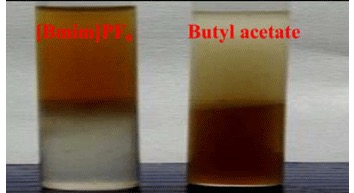
Comment: A fine candidate for the waste disposal container. Yick.
In other words, the production of penicillin G isn't like making widgets. It's an art— fermentation followed by a difficult purification. Seventy years after the antibiotic was discovered, people are still looking for good ways to make it, and haven't found them.
Keep in mind that Pfizer is the only company that still makes the stuff. In a sane world, protestors would be marching at the headquarters of all the companies that used to make it but no longer do so.
Bottom line: This had the feeling of a protest just for the sake of protest. Many of the marcher/chanters who I spoke with had a poor understand of the issue, let alone the facts. Perhaps they were out there because Monsanto headquarters wasn't nearby.
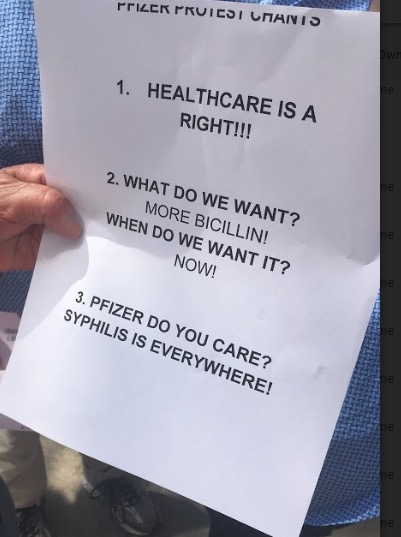
Shades of the Vietnam War
Sorry folks, but you were not being reasonable or fair this time.
Notes:
(1) Pfizer headquarters are on East 42nd Street in Manhattan, about a block from the Council's office. Despite that, they don't give us grants or even buy us lunch.
(2) See: "Syphilis Rates Spike Among U.S. Gay, Bisexual Men: CDC"
(3) See: "America's Vanishing Science Jobs." New York Post June, 2011.
(4) Most, but not all of the quotes were from Ms. Reinhart.
(5) Of the hundreds of drug shortage that have plague us for years, almost all of them are sterile injectables . Specialized procedures are required to make these drugs. These are more challenging than simply putting something into a capsule. (See: "Running Out of Common Drugs." New York Post, August 16, 2011)



